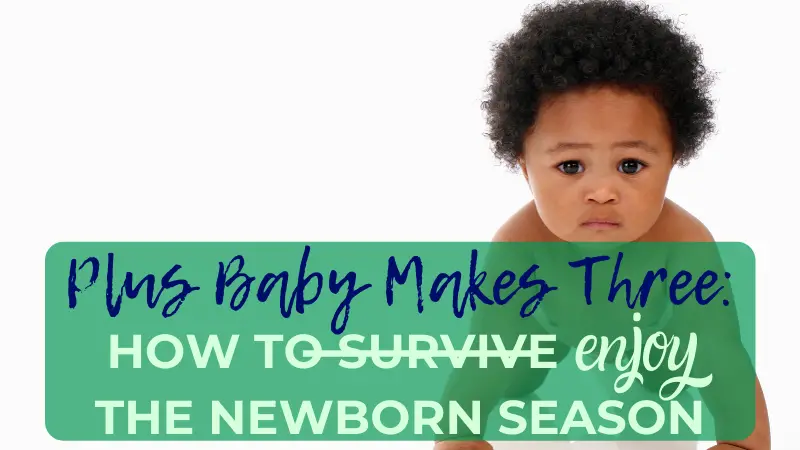I use affiliate links in some blog posts. If you click through and make a purchase, I earn a small commission at no extra cost to yourself. Thank you for your support.
Exactly ten years ago, I became a parent.
In real life, our celebrations this week will be focused on Mister, involving Laserquest and chocolate cake. But on the blog, I’ve been reflecting on how my life changed in Autumn 2009 through this mini-series ‘Plus Baby Makes Three’, offering some thoughts to those who are currently making the adjustment to parenthood.
Whether you’re wondering what you need (and don’t need) before your baby comes, how to make your family life more ethical and sustainable, whether it’s possible to enjoy the newborn phase, or how to connect with God when you’re exhausted by the demands of parenthood, we’ve got you covered, with some incredible guest posts.
I’m very grateful today that we’re hearing from Aggie, a mum of three, who runs a family support drop-in service in the centre of Newcastle. Aggie is passionate, as am I, about empowering parents to discover their unique gifts in parenthood, rather than to beat themselves up because their child doesn’t conform to this book or that expert. If you’re expecting your first child, or are in the throes of early parenthood, I hope Aggie’s words bring you peace today.

One of the first things I hear when mums come in for peer support is “I don’t know what I’m doing wrong, but…”
They say this, often in floods of tears, always in great distress. And, 99% of the time, they are doing absolutely nothing “wrong”, but we as a society are setting them up to fail by not talking about NORMAL newborn behaviour. I believe that being properly prepared for the first few weeks and months would empower parents to be much more confident in their parenting and to know what was normal, and when to seek help.
So here are my top “Normal Newborn Behaviours” – what to do about them, and when to seek help!
“Help, my breastfed baby just wants to feed ALL THE TIME!”
This one is often made worse by well-meaning family members saying things like “surely he/she can’t be hungry again!” or worse “are you sure you’re making enough milk?” This can make new mothers panic and change their feeding, moving to formula or “hungry baby” thickened, more expensive formula.
Cluster-feeding is the term healthcare professionals give to the times when baby wants to feed all the time. Breastfeeding is a supply and demand thing, so the more baby suckles, the more milk your body produces, so while breastfeeding is getting established, or when baby is having a growth spurt, they will often feed more regularly to encourage your breasts to produce more milk.
Also, newborns have TINY tummies, so get full quite quickly, but hungry again soon after.
Don’t worry, it will pass, and while a cluster feeding episode is happening, stock up on nutritious snacks, keep hydrated, delegate the house work and choose some good box sets. I also loved my kindle for being able to read one handed while feeding!
When to get help:
If baby is not gaining weight, breastfeeding is painful or you are not getting plentiful wet nappies, speak to a breastfeeding counsellor or your health visitor to check baby is feeding correctly.
“Help, my baby just won’t let me put it down. I can’t get anything done!”
You know the scene, baby blissfully sleeping in your arms, but as soon as you put him/her down, they wake up and scream. It is exhausting and, faced with media pictures of babies contentedly snoozing in their Moses basket, you start to feel like your baby is broken.
Human babies are born neurologically immature. They struggle to regulate theirtemperature, breathing and nervous system.
They have also been all cosy inside a warm, dark, temperature-controlled, often moving, environment with the only sounds being their mother’s heart beat, blood flow andmuffled sounds from the outside, then suddenly find themselves in a bright, noisy, unfamiliar world.
The only thing that makes sense is their mother, their source of warmth and food. Skin to skihelps with their temperature regulation. It’s no surprise that they only feel safe in your arms.
It can feel overwhelming, but it will pass. In the meantime, rest when you can, and use “other arms” ( eg your partner, family, close friends) to give you a break. Accept that the housework will have to wait. Get a sling or baby carrier (your local sling library will be able to help).
When to get help:
Lots of babies prefer to be in arms, but if baby cries when put down after a feed and seems in pain, it might be worth having a chat with your Health Visitor about reflux, especially if there is a lot of spit-up.
“Help, my baby won’t sleep anywhere other than my arms!”
We’ve all been there! The baby wakes in the night for a feed and just won’t go back in their cot.
This one is made all the more stressful by conflicting advice on bed-sharing. In much of the world, parents accept that babies want to sleep with mum and make that possible. In the west, we expect babies to sleep in cots and there is concern that bedsharing can lead to Sudden Infant Death Syndrome.
The World Health Organisation states that in a breastfeeding relationship, where the person or people in the bed do not smoke, haven’t been drinking and aren’t on drugs or medication, there is no increased risk of SIDS. So, if you think bed-sharing could work for your family, whether short-term or long term, then it is something to consider. Check out the Lullaby Trust for safe bed-sharing information.
Making the cot as comforting an environment as possible can also help – pop a hotwater bottle in the cot to warm it while you are feeding, so the mattress is warm and inviting when you put baby back, And cuddling a muslin and popping it under babies head so that it smells of you can also help (be mindful of suffocation risks).
When to seek help:
If you are getting so over tired that you cannot function or it is affecting your mental health, speak to your health visitor or GP.
“Help! My baby won’t sleep!”
The question I despise the most when directed at new mums is,“Is she good? Does she sleep for you?” Babies are not being naughty when they wake in the night, it’s just that they are babies.
For a start, when in the womb, they are rocked to sleep during the day, and wide awake with a stationary mum at night, then there are all the scary changes with being born, and the need to feed regularly. It takes a while for babies to learn to sleep. Frequent waking in the early weeks and months are normal. And even when baby has it sussed, a growth spurt, developmental leap, illness or other change in the norm can knock it all out of the water again.
For the first few months there is not a lot you can do about your baby’s sleep. Sleep training isn’t recommended until after baby is 6 months.
You can help your baby learn the difference between night and day by keeping night feeds quiet and dark, and day time feeds bright. When you are ready, you could try introducing a bedtime routine. It is recommended, for SIDS prevention, that baby sleeps where you are until six months.
Nap when you can, allow your partner to help and accept that you will be tired and not yourself for a while. Know that it will pass eventually. Sometimes sleep deprivation feels like your baby will never sleep alone – but they all do eventually, even if that eventually is seven!
When to seek help:
As above, if after six months you are still not getting a lot of sleep and you are suffering, speak to your health visitor or GP.
Having a new baby is a wonderful time. It is full of joy and wonder. Enjoy it. It is also a time of learning, exhaustion and overwhelming feelings. Know that this is normal, find other parents to share with and seek help if it all gets too much. Don’t worry, mama, you’ve got this!




[…] need) before your baby comes, how to make your family life more ethical and sustainable, what should be considered ‘normal’, and whether it’s possible to enjoy the newborn phase, we’ve got you covered, with some […]